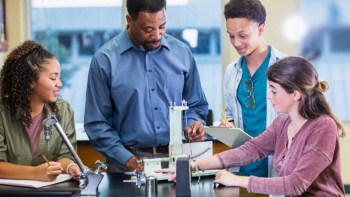Pruthvi Mehta wonders if the standard viva is really the best way to assess PhDs for all students

The end of my PhD on supernova neutrino interactions is approaching at an alarming rate. I expect to submit my thesis by the end of March and the write-up so far has been largely without any hiccups. But that hasn’t stopped me from worrying about what will come soon after I submit: the PhD oral viva. For PhD students, the viva is meant to be the culmination of several years of hard work – or the “living voice” of their work, hence its name viva voce.
A physics PhD viva usually consists of an oral examination where an external examiner is brought in to question the student on their work and on physics in general. That person sits alongside “internal” examiners. For any PhD student nearing the end of their programme, the prospect of having to defend their thesis is a huge source of anxiety, eclipsed only by the thought of what to do after their PhD is over.
Many would expect such an important and final part of a doctoral student’s journey to be rigorously planned, and often, especially on the student’s end, it is. Yet having seen many of my colleagues go through the process, it is concerning how widely procedures differ from student to student even from those within the same department.
The very concept of a several-hours-long oral examination has its faults, especially for students who are neurodivergent or have mental-health issues. Even for neurotypical students, many enter the examination room with their stomach in knots. Giving a 20-minute presentation on their research may be daunting enough for someone who has, for example, severe social anxiety – let alone undertaking a thesis defence lasting potentially several hours.
You might think then that an institution would plan ahead –yet there are many examples of the opposite. One student at Liverpool who had schizophrenia entered a viva examination room and neither the external nor internal examiners knew about this student’s disorder. After a while, due to the stress of the procedure, the student understandably had an acute psychotic episode and was failed by the examiners. The student eventually passed after their disorder became known, but one has to ask how this was allowed to happen in the first place.
Language barrier
One of the main issues about oral vivas is that the remit of the exam is not standardized. The level of expertise of an examiner in relation to the student’s field can differ greatly. For some it may be the spokesperson of the very experiment their research is on, while for others it could be someone only tenuously linked to the field. Who you get could substantially impact the variety and depth of the questions you’ll face.
There is not even a standard length for vivas. I know of one former PhD student in my department who had a viva examination that was six hours long while another’s test was a mere 90 minutes. This is clearly unfair, and in some cases can cause understandable resentment when the outcome or qualification at the end is just the same but the process to get there much more gruelling.
A more radical solution may be to scrap vivas entirely and instead validate the academic rigour of a student’s thesis by using a grading system
So, what can be done about it? One option would be to insist that vivas last for a fixed length of time, just as with written examinations. A more radical solution may be to scrap vivas entirely and instead validate the academic rigour of a student’s thesis by using a grading system. It’s an approach already used in countries such as Germany and Finland.
If that is a step too far, given that oral examinations have been in use for centuries, then perhaps we should change the very nature of the viva itself. Rather than several hours of grilling, perhaps a presentation by the student is enough followed by a few pertinent questions. This would help those whose minds go blank when in a stressful face-to-face meeting. Having a practice viva could also ease any nervousness that anxious students may have, while it should be compulsory to let examiners know if there are any mental-health issues, which could threaten the student’s wellbeing during and after the exam. Why we need to break down the language divide in scientific publishing
There are also aspects of the viva that seem to smack of institutionalized Anglo-centrism, notably the insistence that exams should be carried out in English and the fact that examiners don’t always appreciate that non-native English speakers can face language barriers. Of course, this isn’t unique to vivas, but rather science as a whole.
Professors aren’t always sympathetic or kind to international students for whom English is not their first language. I once even helped a student whose supervisor cited her English-language skills as a reason to discontinue her PhD and put her on a Master’s programme instead. The stress of having to communicate your research verbally in a language that isn’t your mother tongue seems to be an extra layer of pressure for an already anxiety-ridden student.
Another change could be to allow students’ whose first language is not English to carry out all or some of their viva in a different language. There are experts in all fields around the world and it is lazy not to find an examiner who can converse in the student’s preferred tongue.
The viva voce should be allowed to live up to its name – if a student’s thesis defence is supposed to be its living voice, let’s try not to stifle it.



